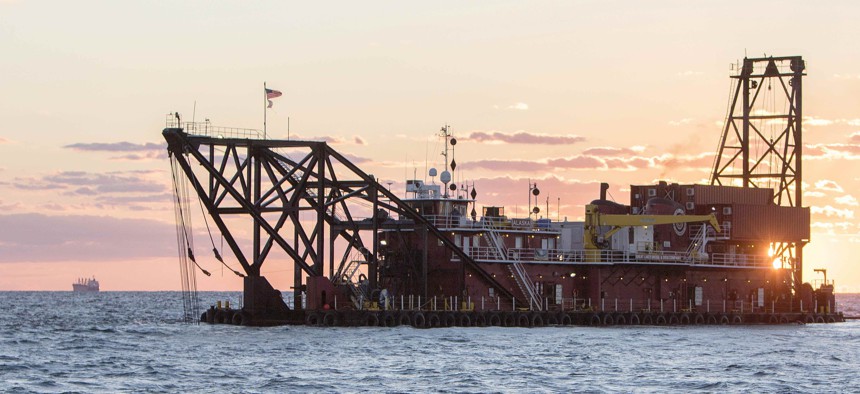Water Infrastructure Legislation Gushes Ahead in Congress

The 300-foot dredge Alaska deepens the shipping channel to the port of Savannah off the coast of Tybee Island, Ga., Monday, Sept. 14, 2015. AP Photo/Stephen B. Morton
A House committee passed its Water Resources Development Act legislation unanimously on Wednesday.
WASHINGTON — A House panel moved forward Wednesday with a bill that would call for certain tax dollars be spent on port and harbor projects in future years.
The House Transportation and Infrastructure Committee unanimously approved its Water Resources Development Act, or WRDA, legislation that would set policy for the U.S. Army Corps of Engineers, an agency involved in public works like dams, locks and harbors.
Committee Chairman Bill Shuster, a Pennsylvania Republican, said the bill could hit the House floor in early June.
Approval of the House measure came one day after the Senate Environment and Public Works Committee passed a more expansive version of the water resources bill. That legislation includes a section that would rework federal loan programs for water and wastewater projects.
The House measure, in contrast, sticks tightly to the business of the Corps, an agency with a roughly $100 billion backlog of water infrastructure construction projects.
"The Senate bill is always different from the House bill, so we'll have to go to conference and figure out the differences," Shuster told reporters after Wednesday's committee vote.
"Keeping it narrow, keeping it focused on Corps projects, is the way you get it through the House," he added.
Because the WRDA bill is not appropriations legislation it would not directly pump new money toward addressing the Corps funding gap.
But a provision in the House bill, highlighted by lawmakers in both parties, seeks to ensure that tax revenue collected for what's known as the Harbor Maintenance Trust Fund goes to harbor and port projects and is not diverted to other parts of the federal budget.
This part of the bill, however, would not take full effect 2029.
The Transportation and Infrastructure Committee's top Democrat, Rep. Peter DeFazio, of Oregon, has championed the provision.
DeFazio explained that the tax in question is collected on imported goods shipped through ports, and that revenues from it total about $2 billion annually. But he said lawmakers have socked away almost $10 billion of these revenues in a "theoretical account" for other purposes.
"This is a real problem," the congressman said Wednesday.
"We are basically stealing from the American people," he added. "They're paying a tax every time they buy an imported good. And Congress is stealing half that money and not spending it on the needed and intended purpose."
Rep. Garret Graves, the Louisiana Republican who chairs a House Transportation and Infrastructure subcommittee on water resources and the environment, echoed DeFazio's view on the trust fund.
"The diversion of dollars is absolutely inappropriate," he said.
Elsewhere in the House bill, there's language to reauthorize dam and levee safety programs.
The legislation also requests a report on the Corps project backlog and a study to look at the possibility of moving the Army Corps out of the Defense Department and into another part of the government.
Lawmakers propose in the bill to "de-authorize" $3 billion in previously authorized water infrastructure projects.
This section of the legislation asks the Corps to submit a list of projects to Congress that were approved for construction prior to November 2007, but have not advanced.
The bill would also newly authorize six projects to be carried out, which would require about $2.4 billion in estimated federal funding. These same six projects would be authorized under the Senate bill.
Two of the projects are located in Florida, two in Texas, one in Hawaii and one in New York.
The most expensive, with a $3.3 billion total price tag and a $2.1 billion federal share, is aimed at reducing the risk from tropical storm surge in three counties south and east of Houston on Texas’ Gulf Coast. It would build a nearly 27 mile levee and flood wall system.
DeFazio on Wednesday decried the loss of congressional "earmarks" for designating high priority projects, saying that the 2011 ban on the practice had resulted in a situation where the Army Corps picks which projects move forward using a "secretive process."
Route Fifty asked Shuster, who is not seeking reelection in November, what he believed would solve the massive backlog of Army Corps construction projects. "Money," he shot back.
He said that directing more Harbor Maintenance Trust Fund dollars to infrastructure projects would help on this front.
"If we were to spend $800 million to a billion dollars additionally a year," he added, "you'd really start to take down that backlog. Not a hundred billion. But you'd be able to make a significant dent."
Bill Lucia is a Senior Reporter for Government Executive's Route Fifty and is based in Washington, D.C.
NEXT STORY: Why We Need a National Infrastructure Map






